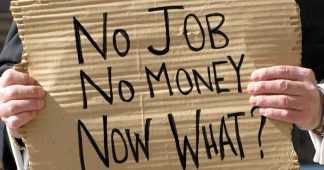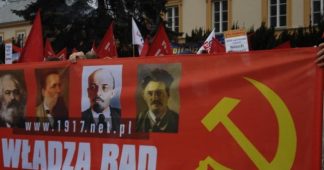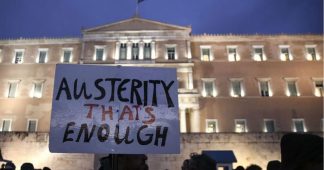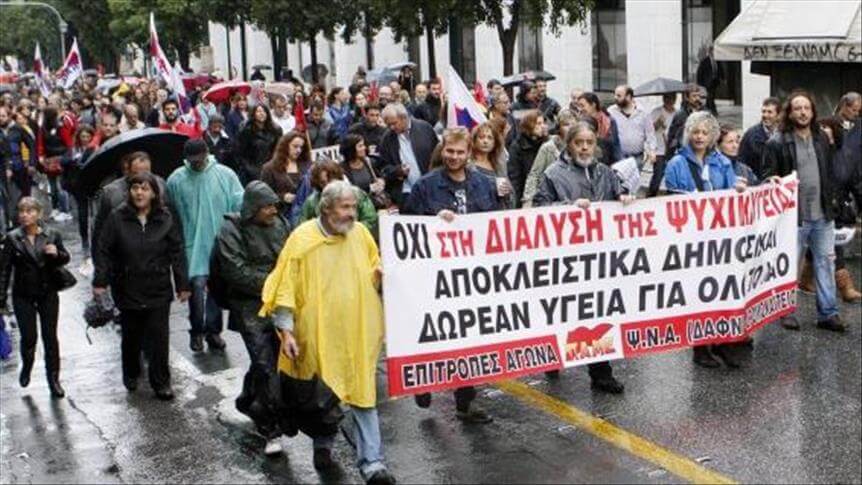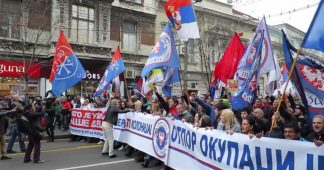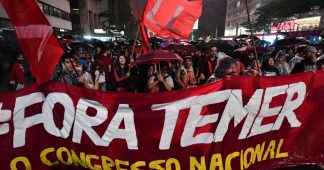25/06/2014
Text below is a translation of the article “25 lat kontrrewolucji”
25 years passed since the symbolic end of the People’s Republic of Poland (PRL) and the final fruition of long process of counterrevolution. New, “free” Poland has brought us plagues that we haven’t know before: unemployment, homelessness, mendicancy and child malnutrition.
Every couple of years, because of the anniversary of June 4, 1989 elections, a wave of bourgeois propaganda sweeps our country under the banner of “anniversary of regaining freedom”. As the President Bronisław Komorowski put it today: “We became free people and it depended on us how we would use this regained freedom, how we would manage it, how we would strengthen it”.
He didn’t explain though, how one is supposed to be free in a country with over a dozen percent unemployment rate – something unheard of in the ‘enslaved’ PRL. How one is supposed to be free, when people have to slave away till they’re 67 years old (if some ‘entrepreneur ‘ is willing to employ an 60-year-old) in order to have a right to pension? This wasn’t a problem when ‘the commies’ were in power. Right to pension was one of basic rights back then. What’s the meaning of freedom, Mr. Komorowski, in a country where number of jobs from 1989 to 2011 dwindled by 6 million, where unemployment, job insecurity and repressive social policy forced people to work in worst conditions or to emigrate? In a country where the overwhelming majority barely makes ends meet, in a country of cheap labor, in one of the poorest countries of the EU – there is nothing to celebrate.
Of course it all depends how you look at it, or – in other words – what class you represent. And the statistics are devastating and clearly show, that the Polish bourgeoisie is the only one with reasons to celebrate. According to bankier.pl labor costs in Poland are among the lowest in the EU – 7,60 Euro per hour compared to the EU average of 23,70 Euro per hour. And we’re not catching up, as Balcerowicz would want us to believe. Labor costs remained stagnant since 2008, while in the EU they did grow by 10 percent – from 21,40 to 23,70 Euro – despite the depression.
‘Free’ Poland is free only for the capitalists. It’s a country where people with most reasons to laugh are CEOs of international companies like Fiat, which haven’t paid a single grosz of taxes in 22 years, or of supermarket chains and factories in the ‘Special Economic Zones’.
Useful idiots
On June 4th on the main website of the Democratic Left Alliance (SLD) appeared a short – and naïve – column. Councillor of the Provincial Assembly of Mazowieckie, Grzegorz Pietruczuk, writes in it:
On June 4th we celebrate Freedom Day as a symbolic date of the end of the Polish People’s Republic and the beginning of the Third Republic. I was wondering what is the meaning of the anniversary and past quarter of a century to me personally. Can we now imagine everyday life without shopping malls, without access to the Internet, computers? Can we imagine that traveling abroad was horribly difficult? Can we imagine life without all the amenities that we now have?
The last 25 years is a time of great change in the world and in Poland. We are in fact participants of an incredible leap forward.
PRL’s leap forward and Third Republic’s fall backwards
OK, but what does it have to do with anything? Older people, or those who better know history, will remember the technological and civilsationary leap during the first 25 years of the Polish People’s Republic noticeable to the ordinary citizen was much larger. During the first 25 years of the country’s communist regime Poland evolved from a typically agricultural society into and industrial-agricultural one, peasants – who were previously walking barefoot and living in mud huts – moved into modern housing estates with running water, sewer systems, access to radio and television. The country, including the capital, was rebuilt from the massive wartime ruins. In a short time, it eliminated illiteracy and introduced full employment, therefore throwing unemployment into the dustbin of history. It introduced free and universally accessible education and health care. A system of social security, pensions and holiday benefits for working people was established. It built thousands of new schools, factories and even whole new cities – like Nowa Huta, the Legnica Copper Basin, Katowice Steelworks, FSO and many other establishments of which only portion remains.
And what kind of leap forward we made after 25 years of capitalism? Besides, what the global technical progress has brought us (a quarter of a century ago no one heard about the Internet or mobile phones), we can rather talk about regression – mass unemployment, economic emigration, closed workplaces, Special Economic Zones, where the workers are forced to work even 16 hours a day in order to feed their families. The old scourges of capitalism, forgotten in the PRL, have returned. So we have massive unemployment, thousands homeless, living out of begging and what they find in trashcans – pictures completely unknown in PRL and considered then by many a creation of ‘Communist propaganda’. The working people got to play a new, free-market game – ‘guess when and if at all the capitalist will pay for your work’. Under ‘communist totalitarianism’ it was unthinkable and therefore this game was completely unknown. In ‘free’ Poland we also have 700,000 malnourished children – as claimed by the Polish Red Cross – or ‘only’ 70,000, as claimed by the court sociologists of the Civic Platform. Even if it is “only” 70 thousand, it is 70 thousand too much! Under communism someone responsible for something like this would end up with a bullet in his head.
But as Mr. Pietruczuk acknowledges:
It’s hard to get the quantitative and qualitative extent of changes experienced in the last quarter of a century.
One can plainly see that Pietruczuk doesn’t ‘get it’, although he’s a political scientist, so he should. Especially considering that for the vast majority of our society, the social costs of the ‘transformation’ are obvious.
Genesis of counterrevolution
Following the alliance of the Stalinist bureaucracy with the liberal faction of the “Solidarity” opposition and global centers of imperialism, the Polish deformed workers state was destroyed, the national wealth was plundered and the capitalist system based on exploitation of workers and working people was reintroduced. All-out counterrevolution in Poland – which was a culmination of a process lasting at least since the seventies – was a clear sign to the Stalinist nomenclature throughout the Eastern bloc, that the time of looting has come. In most of these countries, in face of lack of any significant anti-socialist opposition, the so-called “democratic” transformation was initiated by cliques formed within the ruling parties. The process of capitalist restoration took over in a short time almost all countries where this system was overthrown, from the German Democratic Republic in the west, through the Union of Soviet Socialist Republics, to the People’s Republic of China, with the only difference being that in the PRC, the ruling nomenclature has not even changed the window dressing and the restoration of capitalism took place under the banner of the Communist Party, without restoration of the institutions of bourgeois democracy.
Thus the prediction of Leon Trotsky, one of the leaders of the October Revolution, was fulfilled. In his most important book “The Revolution Betrayed – What is the Soviet Union and Where is it Going?” published in 1937, he wrote:
“Let us assume to take a third variant – that neither a revolutionary nor a counterrevolutionary party seizes power. The bureaucracy continues at the head of the state. Even under these conditions social relations will not jell. We cannot count upon the bureaucracy’s peacefully and voluntarily renouncing itself in behalf of socialist equality. If at the present time, notwithstanding the too obvious inconveniences of such an operation, it has considered it possible to introduce ranks and decorations, it must inevitably in future stages seek supports for itself in property relations. One may argue that the big bureaucrat cares little what are the prevailing forms of property, provided only they guarantee him the necessary income. This argument ignores not only the instability of the bureaucrat’s own rights, but also the question of his descendants. The new cult of the family has not fallen out of the clouds. Privileges have only half their worth, if they cannot be transmitted to one’s children. But the right of testament is inseparable from the right of property. It is not enough to be the director of a trust; it is necessary to be a stockholder. The victory of the bureaucracy in this decisive sphere would mean its conversion into a new possessing class. On the other hand, the victory of the proletariat over the bureaucracy would insure a revival of the socialist revolution.”[5]
Notes:
[1] http://www.bankier.pl/wiadomosc/Zarobki-w-Unii-coraz-wyzsze-w-Polsce-stoja-w-miejscu-3093386.html
[2] Grzegorz Pietruczuk’s column: http://www.sld.org.pl/aktualnosci/12573-pietruczuk_moje_25cio_lecie_wolnosci.html
[3] President B. Komorowski’s speech on June 4th, 2014: http://www.pap.pl/palio/html.run?_Instance=cms_www.pap.pl&_PageID=1&s=infopakiet&dz=kraj&idNewsComp=&filename=&idnews=164891&data=&status=biezace&_CheckSum=-1807620943
[4] List of Polish powiats [counties] by unemployment rate: http://gospodarcza.blogspot.com/2013/05/najwieksze-bezrobocie-w-polsce-ranking.html
[5] Leon Trotsky, “The Revolution Betrayed – What is the Soviet Union and Where is it Going?”: http://www.marxists.org/archive/trotsky/1936/revbet/ch09.htm#ch09-3
Published at http://www.1917.net.pl/node/19050
